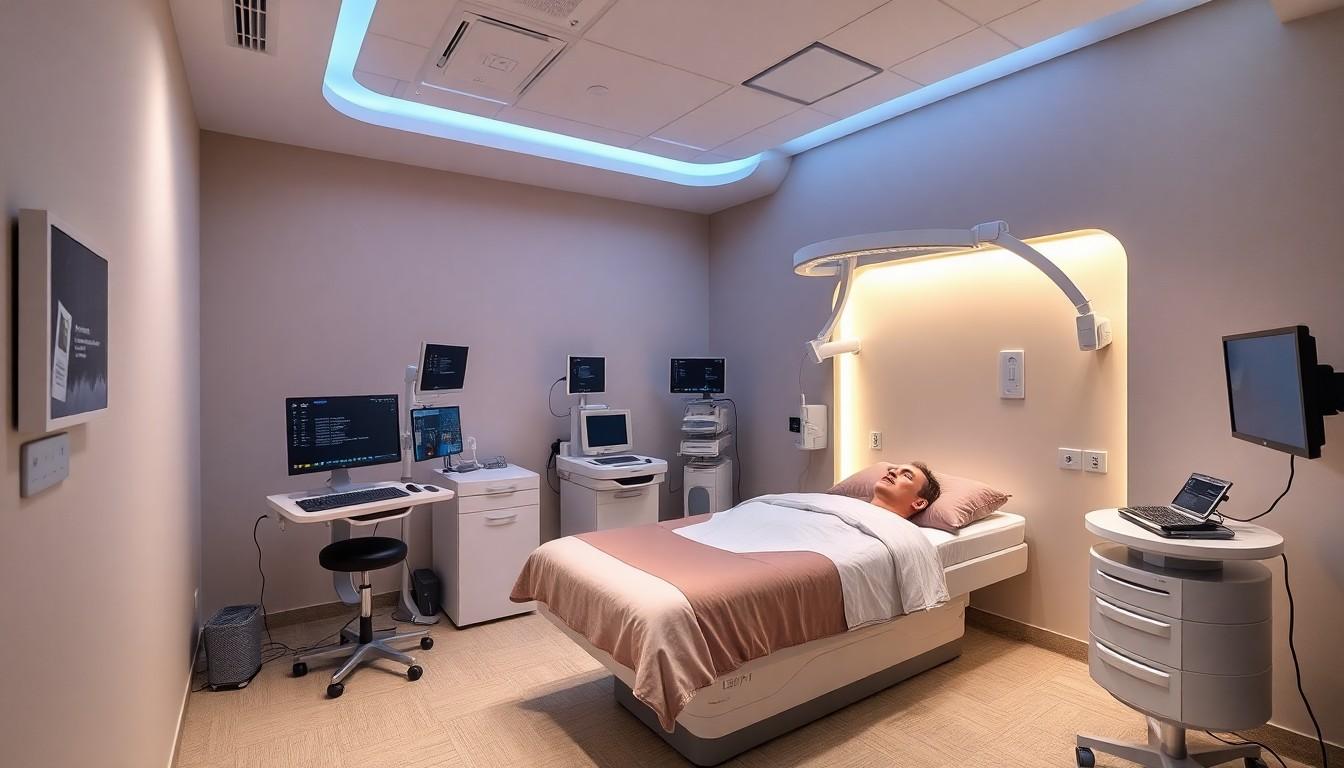Sleep medicine has emerged as a vital healthcare specialty addressing the growing concerns around sleep disorders and their impact on overall health. With millions of Americans struggling with conditions like sleep apnea insomnia and narcolepsy the demand for qualified sleep medicine professionals continues to rise.
The field offers diverse career opportunities for healthcare professionals passionate about helping patients achieve better sleep quality. From sleep physicians and technologists to respiratory therapists and clinical coordinators these specialists work in various settings including sleep centers hospitals and private practices. As awareness of sleep-related health issues grows the job market for sleep medicine professionals expands creating promising career prospects with competitive salaries and advancement opportunities.
What Is Sleep Medicine
Sleep medicine focuses on diagnosing treating sleep disorders that affect physical mental health. This medical specialty combines expertise from multiple disciplines including neurology pulmonology psychiatry to address various sleep-related conditions.
Common Sleep Disorders and Treatments
Sleep medicine specialists diagnose treat three primary disorders:
- Sleep Apnea: A breathing disorder causing repeated airway blockage during sleep treated with CPAP therapy oral appliances lifestyle modifications
- Insomnia: Difficulty falling or staying asleep managed through cognitive behavioral therapy medications sleep hygiene practices
- Narcolepsy: A neurological condition causing excessive daytime sleepiness treated with stimulant medications scheduled naps lifestyle adaptations
- Medical Degree: Completion of MD or DO program from an accredited medical school
- Residency: 3-4 years in primary specialty (pulmonology neurology psychiatry)
- Fellowship: 1-2 year specialized training in sleep medicine
- Board Certification: Passing the American Board of Sleep Medicine examination
- State Licensure: Valid medical license in practicing state
- Continuing Education: Annual completion of 25 credit hours in sleep medicine updates
| Certification Type | Duration | Required Clinical Hours |
|---|---|---|
| RPSGT | 18 months | 546 hours |
| ABSM | 12 months | 1,000 hours |
| Sleep Medicine Fellowship | 12-24 months | 2,000+ hours |
Types of Sleep Medicine Career Paths

Sleep medicine offers diverse career opportunities across multiple specialties. Medical professionals in this field collaborate to diagnose, treat, and manage various sleep disorders through specialized roles and responsibilities.
Sleep Medicine Physicians
Sleep medicine physicians complete a comprehensive educational path spanning 11-13 years:
- Bachelor’s degree with pre-med coursework in biology, chemistry, physics, and mathematics
- Four-year medical school program earning an MD or DO degree
- Residency training in specialties like internal medicine, psychiatry, pediatrics, neurology, family medicine, otolaryngology, or anesthesiology (3-7 years)
- Sleep medicine fellowship lasting 1-2 years
Sleep Lab Technologists
Sleep lab technologists serve as technical specialists in sleep studies:
- Monitor patient vital signs during overnight sleep studies
- Operate specialized diagnostic equipment
- Record sleep patterns using polysomnography equipment
- Analyze collected data for physician interpretation
- Maintain sleep lab equipment and supplies
- Guide patients through sleep study procedures
Sleep Medicine Advanced Practice Providers
Advanced practice providers deliver specialized sleep care:
- Nurse Practitioners (NPs):
- Conduct patient assessments
- Order diagnostic tests
- Prescribe sleep medications
- Provide patient education
- Physician Assistants (PAs):
- Evaluate sleep disorders
- Develop treatment plans
- Monitor patient progress
- Collaborate with sleep physicians
Each role requires specific certifications and ongoing education to maintain professional standards in sleep medicine practice.
Work Settings and Environments

Sleep medicine professionals practice in three primary healthcare settings, each offering distinct advantages and specialized environments for patient care. These settings enable comprehensive sleep disorder diagnosis treatment through various technological capabilities and collaborative opportunities.
Sleep Centers and Clinics
Sleep centers and clinics provide specialized environments equipped with advanced polysomnography systems and monitoring equipment. These facilities feature dedicated sleep study rooms, diagnostic tools for measuring brain waves, heart rate, blood oxygen levels during sleep studies. Sleep specialists collaborate with technologists in these centers to analyze sleep patterns, diagnose disorders and develop targeted treatment plans.
Hospitals and Medical Centers
Hospital-based sleep medicine departments integrate with broader healthcare services, creating a multidisciplinary approach to patient care. Sleep specialists work alongside neurologists, pulmonologists, psychiatrists to address complex cases requiring coordinated treatment. These facilities maintain 24/7 operations with emergency capabilities, extensive diagnostic resources and inpatient monitoring options for severe sleep disorders.
Private Practice Opportunities
Private sleep clinics offer personalized care environments with flexible scheduling and focused patient interactions. Sleep medicine physicians in private practice manage their own facilities, set operational protocols and build long-term patient relationships. These settings typically feature consultation rooms, diagnostic equipment and treatment spaces while maintaining relationships with larger healthcare networks for complex cases requiring additional resources.
| Setting Type | Key Features |
|---|---|
| Sleep Centers | Advanced polysomnography equipment, dedicated study rooms |
| Hospitals | 24/7 operations, multidisciplinary teams, emergency support |
| Private Practice | Flexible scheduling, personalized care, independent operations |
Salary and Compensation

Sleep medicine physicians earn competitive salaries in the healthcare industry, with compensation varying based on location, experience, and practice type. The estimated total annual compensation for sleep medicine physicians ranges from $241,437 to $325,426 in the United States.
Factors Affecting Income
Sleep medicine physician compensation depends on several key factors:
- Practice Type: Private practices often generate higher income potential through direct patient care and additional service offerings
- Experience Level: Physicians with 5+ years of specialized sleep medicine experience command higher salaries
- Board Certifications: Additional certifications in sleep medicine subspecialties increase earning potential
- Patient Volume: Higher patient loads and procedure numbers correlate with increased compensation
- Facility Size: Larger sleep centers and hospital systems typically offer more comprehensive benefits packages
- Academic Involvement: Teaching positions at medical institutions may include supplemental research grants and education stipends
Regional Pay Differences
Geographic location significantly impacts sleep medicine physician salaries:
| Location | Salary Range (Annual) |
|---|---|
| New York City | $281,999 – $380,097 |
| New York State | $82,500 – $145,000 |
| National Average | $280,139 |
- Cost of Living: Metropolitan areas offer higher base salaries to offset increased living expenses
- Market Demand: Areas with sleep center shortages provide competitive compensation packages
- Population Demographics: Regions with aging populations create increased demand for sleep services
- Insurance Reimbursement: States with favorable insurance policies enable higher physician compensation
Career Growth and Development

Sleep medicine professionals experience continuous growth opportunities through specialized certifications, research involvement, and academic positions. Career advancement paths vary based on education, experience, and specialization choices.
Sleep Technologists
Sleep technologist careers expand through accredited programs and certifications. The Committee on Accreditation for Polysomnographic Technologist Education (CoA-PSG) programs provide essential training for the Registered Polysomnographic Technologist (RPSGT) certification. A-STEP accredited programs combine:
- Hands-on clinical experience in sleep laboratories
- Technical expertise in polysomnography equipment
- Patient care and monitoring skills
- Data analysis and interpretation training
Sleep Medicine Physicians
Sleep medicine physicians advance through specialized training and board certifications. The career pathway includes:
- Medical degree completion
- Three-year residency program
- One to two-year sleep medicine fellowship
- Board certification maintenance
Research Opportunities
Sleep medicine research offers career advancement through:
- Clinical trials coordination
- Sleep disorder studies
- Medical device development
- Publication in peer-reviewed journals
- Grant funding opportunities
- Collaboration with pharmaceutical companies
Teaching and Academic Positions
Academic careers in sleep medicine include:
- Medical school faculty appointments
- Clinical instruction for sleep technologist programs
- Conference presentations
- Curriculum development
- Mentorship programs
- Research supervision
- Fellowship program direction
The field offers multiple advancement paths focusing on clinical expertise, research contributions, or academic leadership. Each career track provides opportunities for professional growth through continuing education, specialized certifications, and increasing responsibilities.
Work-Life Balance in Sleep Medicine
Sleep medicine practitioners enjoy a balanced lifestyle due to the specialty’s structured outpatient focus. The field offers distinct advantages in managing professional and personal commitments effectively.
Nature of Practice
Sleep medicine’s outpatient-based structure creates predictable work schedules. Physicians perform three primary activities:
- Conducting consultative visits with patients
- Managing ongoing treatment plans
- Interpreting diagnostic sleep studies including polysomnography tests
Clinical Responsibilities
The clinical duties of sleep medicine physicians center on office-based care with minimal emergency coverage requirements. Two common practice models exist:
- Exclusive Sleep Medicine Practice
- Regular daytime office hours
- Scheduled patient consultations
- Planned study interpretations
- Limited on-call responsibilities
- Combined Specialty Practice
- Integration with primary specialties:
- Pulmonary/critical care
- Neurology
- Psychiatry
- Shared call schedules
- Diverse clinical responsibilities
This structured approach to patient care enables sleep medicine professionals to maintain consistent schedules while delivering specialized medical services. The outpatient setting facilitates systematic workflow planning with designated times for consultations diagnostic interpretations.
Job Market Outlook and Trends
Market Growth
Sleep medicine presents a robust market expansion with significant financial projections. The U.S. sleep disorder clinics market value stands at USD 6.11 billion in 2023 with an expected increase to USD 8.43 billion by 2029, growing at a 5.51% CAGR. The sleep study market demonstrates parallel growth, projecting to reach USD 12,678.6 million by 2034 at a 6.50% CAGR from 2024.
| Market Segment | Current Value | Projected Value | CAGR |
|---|---|---|---|
| Sleep Disorder Clinics | $6.11B (2023) | $8.43B (2029) | 5.51% |
| Sleep Studies | – | $12.68B (2034) | 6.50% |
Employment Landscape
The employment landscape in sleep medicine reflects a complex balance of opportunities and limitations:
- Geographic Distribution: Job opportunities concentrate in urban centers with limited rural positions
- Market Saturation: Physician positions face increased competition particularly in specific geographic regions
- Practice Settings: Positions exist across multiple environments:
- Hospital-based sleep centers
- Independent sleep clinics
- Academic medical centers
- Private practice groups
- Rising awareness of sleep health importance
- Increasing diagnosis rates of sleep disorders
- Growing elderly population requiring sleep care
- Enhanced insurance coverage for sleep studies
- Technological advancements in sleep diagnostics
Conclusion
Sleep medicine represents a dynamic and rewarding career path with substantial growth potential in the healthcare industry. The field offers diverse opportunities for professionals at various levels from sleep technologists to physicians with competitive salaries and excellent work-life balance.
As sleep disorders continue to affect millions of Americans the demand for qualified sleep medicine specialists will likely persist. With projected market growth technological advances and increasing public awareness about sleep health professionals entering this field can expect strong job security and numerous opportunities for career advancement.
The structured nature of sleep medicine practice combined with the satisfaction of helping patients improve their quality of life makes it an attractive specialty for healthcare professionals seeking a meaningful and sustainable career path.
